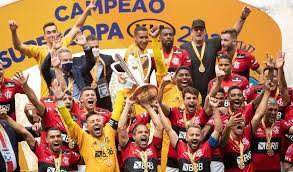June 30 – Weeks after telling the Confederation of Brazilian Football (CBF) of new winds in the game, Brazilian clubs have opened talks with potential partners to form a new league structure.
Earlier this week, clubs in the Brazilian top flight and the Serie B convened to consider the path forward for the professional club game in the country.
KPMG, a group led by lawyer Flavio Zveiter and Ricardo Fort, former Coca Cola executive, and Livemode presented league models to the clubs, according to Brazilian media outlet Globo.
The Zveiter group comprised a number of outside consultants including Charlie Stillitano from Relevant Sports Group and Rick Parry, ex-Liverpool and chair of the English Football League. Management consultants McKinsey Brasil also gave a presentation.
The presentations outlined that in a new structure there would be increased and new revenue streams, allowing the clubs to refinance their debts. In the new league, TV rights would be centralised for national and international exploitation, with the different groups projecting revenue streams of 3 billion Reais and new investment from private equity.
Earler this month, top flight clubs announced that they wanted to establish a league governing body to run the Serie A and gain more of an influence in how the Brazilian game is administered. In a rare moment of unity, 19 of the 20 Serie A club handed over a document to the CBF, stating their intent to create a league structure as early as 2022. Brazil is the only top ten country in the world where the federation still controls the running of the country’s top professional league at a domestic level
Brazil’s ruling body has been under immense pressure, ever since Conmebol moved the Copa America to the country at the eleventh hour with the backing of both Rogerio Caboclo, who has been suspended for 30 days from his role as CBF supremo over allegations of sexual harassment, and president Jair Bolsonaro, one of the last heads of state who insists on ignoring the Covid-19 crisis.
But the move by the clubs is a new blow to the CBF, which together with the state federations has long prevented any meaningful reform in Brazilian football, capitalising on constant division among the clubs. This time, however, a sense of change is palpable. The clubs want to prioritise the launch of a proper governing body for the league.
“It’s an irreversible situation,” said Ponte Preta director Décio Sirbone earlier this week. “We created a working group now, there is a law firm already hired to do the work involving documentation and we made an organizational chart so that by October the league’s statute is ready.”
Contact the writer of this story at moc.l1744761917labto1744761917ofdlr1744761917owedi1744761917sni@i1744761917tnuk.1744761917ardni1744761917mas1744761917

